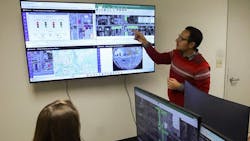SUNY Poly launches AI lab
The Transportation Research AI Lab (TRAIL) has offcially been opened by the SUNY Polytechnic Institute (SUNY Poly) to serve as a hub for innovation in smart transportation, sustainability and equity, as well as traffic operation and safety. TRAIL was founded by Assistant Professor of Transportation Engineering, Dr. Abolfazl Karimpour through a combination of external and internal grants.
“Our research team is at the forefront of pioneering advancements, utilizing data-driven AI and machine learning solutions to address transportation challenges in four key areas: Operation, safety, sustainability and resiliency,” said Karimpour. “TRAIL focuses on research, education and workforce development initiatives. Students using TRAIL are supported by these funded projects, gaining hands-on experience in transportation analysis, data analysis and how to apply this knowledge to benefit the public.”
“I commend Dr. Karimpour for his work in establishing TRAIL at SUNY Poly, which is a tremendous resource for our students and faculty,” said Interim Dean of the College of Engineering and Associate Provost for Research Dr. Michael Carpenter. “Furthermore, TRAIL will enhance transportation systems’ efficiency, safety and resilience and position SUNY Poly as leaders in the field, driving forward innovative solutions for the future of transportation.”
TRAIL is currently being utilized by students working with Karimpour as part of SUNY Poly’s Summer Undergraduate Research Program (SURP) and by his undergraduate research assistants.
The lab is equipped with strong computing systems, transportation software and has access to statewide traffic data. TRAIL serves both educational and research purposes, supporting endeavors such as classes, independent studies and capstone projects while utilizing its resources for conducting research simultaneously. Further enhancing its capabilities, emerging data collection technologies like UAVs and virtual reality sets will be added during the summer.
